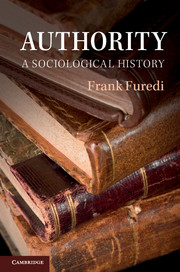Book contents
- Frontmatter
- Contents
- Preface
- Introduction: always in question
- 1 Thersites and the personification of anti-authority
- 2 Socrates and the quest for authority
- 3 Rome and the founding of authority
- 4 Augustus: a role model for authority through the ages
- 5 Medieval authority and the Investiture Contest
- 6 Medieval claim-making and the sociology of tradition
- 7 Reformation and the emergence of the problem of order
- 8 Hobbes and the problem of order
- 9 The rationalisation of authority
- 10 The limits of the authority of the rational
- 11 Taming public opinion and the quest for authority
- 12 Nineteenth-century authority on the defensive
- 13 Authority transformed into sociology's cause
- 14 The rise of negative theories of authority
- 15 By passing authority through the rationalisation of persuasion
- 16 In the shadow of authoritarianism
- Conclusion: final thoughts
- Bibliography
- Index
- References
15 - By passing authority through the rationalisation of persuasion
Published online by Cambridge University Press: 05 June 2014
- Frontmatter
- Contents
- Preface
- Introduction: always in question
- 1 Thersites and the personification of anti-authority
- 2 Socrates and the quest for authority
- 3 Rome and the founding of authority
- 4 Augustus: a role model for authority through the ages
- 5 Medieval authority and the Investiture Contest
- 6 Medieval claim-making and the sociology of tradition
- 7 Reformation and the emergence of the problem of order
- 8 Hobbes and the problem of order
- 9 The rationalisation of authority
- 10 The limits of the authority of the rational
- 11 Taming public opinion and the quest for authority
- 12 Nineteenth-century authority on the defensive
- 13 Authority transformed into sociology's cause
- 14 The rise of negative theories of authority
- 15 By passing authority through the rationalisation of persuasion
- 16 In the shadow of authoritarianism
- Conclusion: final thoughts
- Bibliography
- Index
- References
Summary
It is worth recalling that modern utilitarian and liberal theory emerged in the eighteenth century on the supposition that the ‘foundation of order in society is reason in individuals’. The belief that persuasion rather than force constituted the foundation of order had as its premise the belief that, through free speech and communication, the public could be influenced to act in accordance with reason and their interest. Moreover, the liberal utilitarian theories of the eighteenth century regarded the ‘development of public opinion as a constituent component of social order’. Such optimistic sentiments towards the role of public opinion were antithetical to the subsequent psychological turn in political thought, and its claim that order was founded on irrational and non-rational sentiments.
In sociological theories the problem posed by the power of irrational forces was linked to an interpretation of the process of modernisation, or rationalisation. The disruptive impact of the erosion of tradition was linked to a state of anomie or normlessness, which in turn fostered a climate of existential insecurity. As Weber's own theory indicated, rationalisation has a corrosive effect on the foundation on which authority is exercised. This insight was developed by Talcott Parsons in the 1930s and 1940s to explain both the perilous threat facing liberal democracies and the influence of authoritarian power. After pointing out that the very development of ‘rational-legal patterns’ undermined ‘many of the values which have played an important part in our past history’, Parsons warned that the erosion of these traditional sources of authority represents ‘one of the most important sources of widespread insecurity’.
- Type
- Chapter
- Information
- AuthorityA Sociological History, pp. 350 - 375Publisher: Cambridge University PressPrint publication year: 2013



